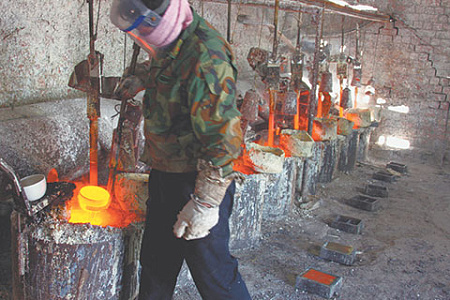
Beijing has significantly escalated its control over rare earth elements (REEs) and their crucial processing technologies, alongside restricting its citizens’ participation in overseas mining without explicit state approval. These stringent new measures are taking effect just as a potential high-level meeting between Chinese President Xi Jinping and U.S. President Donald Trump looms, underscoring a strategic maneuver by China, which commands an overwhelming global share of REE production and refining.
The Ministry of Commerce in Beijing is spearheading these sweeping changes, stipulating that any product containing even 0.1% of Chinese-originated rare earth metals or processed using Chinese technology will now require an export license from Beijing. This extends China’s regulatory reach far beyond raw material extraction, encompassing intellectual property and advanced processing know-how, thereby equipping Beijing with a potent new instrument in its intensifying geopolitical rivalry with Washington.
A particularly sharp edge of these regulations is directed at defense industries. Foreign companies involved in arms manufacturing or working with military agencies will face outright denial of export licenses. Similarly, applications from firms suspected of aiding terrorist organizations through military equipment sales will be rejected, highlighting a clear strategic focus on national security and global influence.
While new regulations governing rare earth mining are slated to take effect on December 1, those pertaining to technologies and personnel are already in force, according to China’s Ministry of Commerce. Experts, including George Chen, a partner at The Asia Group, interpret these measures as a direct challenge to U.S. defense capabilities, aiming to constrain Washington’s technological edge.
Rare earth elements are indispensable components in a myriad of advanced industries, from electric vehicles and consumer electronics to sophisticated weaponry and semiconductors. The ongoing U.S.-China strategic competition has already triggered significant disruptions in global REE supply chains this year. American analysts, such as Wendy Cutler, a former USTR negotiator, acknowledge that China’s aggressive stance could compel the U.S. to offer concessions in upcoming negotiations, potentially including tariff reductions or easing U.S. export controls.
This is not the first time Beijing has wielded its rare earth dominance as a potent bargaining chip in trade disputes. However, the timing of these new export controls—just weeks ahead of a possible face-to-face encounter between President Xi Jinping and President Trump at the APEC Forum in South Korea this October—lends particular weight to their strategic intent.
George Chen observes that Chinese negotiators are demonstrating increasing sophistication in advancing their national interests, often anticipating American demands. Indeed, Beijing began demanding proof from foreign companies by late last year that exported rare earths would not be used for military purposes. Following a temporary trade truce with Washington in May, China introduced single-use export licenses, affecting not only U.S. firms but also European companies. The European Union Chamber of Commerce in China has reported that compliance with these new opaque and labyrinthine regulations has cost some European businesses millions of euros, leading to widespread complaints about bureaucratic hurdles.
In an apparent effort to temper international criticism, a representative from China’s Ministry of Commerce indicated that restrictions could be eased in urgent circumstances, such as providing humanitarian medical aid or responding to natural disasters, although the specifics remain vague.
Vasily Kashin, a senior research fellow at the Higher School of Economics, draws parallels between this situation and the dynamics seen during the Xi-Biden meeting in San Francisco in November 2023. He posits that the current moves are about establishing “rules of the game” amidst an intensifying, yet interdependent, confrontation between the two global powers. “Both countries view each other as opponents, yet their production chains remain intertwined,” Kashin explained. “Neither the U.S. nor China truly wishes to sever these ties completely, as both would suffer significant damage. Their goal is thus a ‘managed divorce’—a process that will unfold over many years, acknowledging that the era of robust economic interdependence is receding, but demanding careful stewardship. China’s actions regarding rare earths are unequivocally designed to strengthen its hand in these critical negotiations with the United States.”
